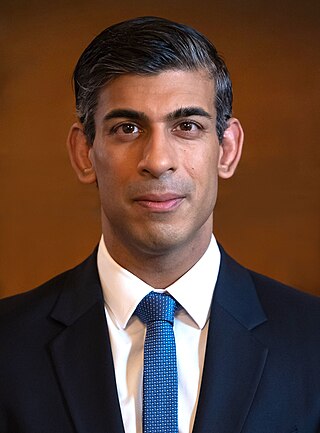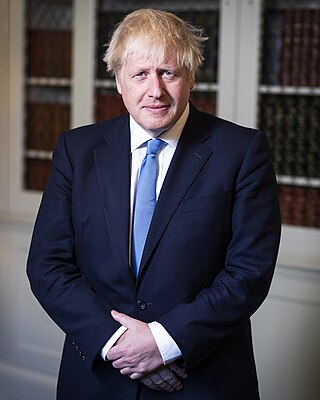
The Chancellor of the Duchy of Lancaster is a ministerial office in the Government of the United Kingdom. Excluding the prime minister, the chancellor is the highest ranking minister in the Cabinet Office, immediately after the Prime Minister, and senior to the Minister for the Cabinet Office. The role includes as part of its duties the administration of the estates and rents of the Duchy of Lancaster.

The secretary of state for Scotland, also referred to as the Scottish secretary, is a secretary of state in the Government of the United Kingdom, with responsibility for the Scotland Office. The incumbent is a member of the Cabinet of the United Kingdom. Much of the Secretary of State for Scotland's responsibility transferred to the office of the First Minister of Scotland upon the re–establishment of both the Scottish Government and Scottish Parliament in 1999 following the Scotland Act 1998.

A Parliamentary Private Secretary (PPS) is a Member of Parliament (MP) in the United Kingdom who acts as an unpaid assistant to a minister or shadow minister. They are selected from backbench MPs as the 'eyes and ears' of the minister in the House of Commons.

Gregory William Hands is a British politician serving as Minister for London and Minister of State for Trade Policy since November 2023. He has served as the Member of Parliament (MP) for Chelsea and Fulham, previously Hammersmith and Fulham, since 2005. A member of the Conservative Party, he served as its Chairman from February to November 2023. Hands has served as Minister of State for Trade Policy under four prime ministers, holding the office on four occasions, and also served as Minister of State for Business, Energy and Clean Growth from 2021 to 2022.

The Minister of State for Europe, is a ministerial position within the Government of the United Kingdom, in charge of affairs with Europe. The Minister can also be responsible for government policy towards European security; defence and international security; the Falkland Islands; polar regions; migration; protocol; human resources; OSCE and Council of Europe; relations with Parliament; British Overseas Territories of Gibraltar and Sovereign Base Areas in Cyprus; and FCO finance, knowledge and technology.

David George Hamilton Frost, Baron Frost is a former British diplomat, civil servant and politician who served as a Minister of State at the Cabinet Office between March and December 2021. Frost was Chief Negotiator of Task Force Europe from January 2020 until his resignation in December 2021.

Simon Anthony Hart is a British politician serving as the Chief Whip of the House of Commons and Parliamentary Secretary to the Treasury since October 2022. He previously served as Secretary of State for Wales in the Johnson government from 2019 to 2022. A member of the Conservative Party, he has been the Member of Parliament (MP) for Carmarthen West and South Pembrokeshire since 2010.

Rishi Sunak is a British politician who has served as Prime Minister of the United Kingdom and Leader of the Conservative Party since 2022. The first British Asian prime minister, he previously held two cabinet positions under Boris Johnson, latterly as Chancellor of the Exchequer from 2020 to 2022. Sunak has been Member of Parliament (MP) for Richmond (Yorks) since 2015.

Wendy Morton is a British politician who served as Chief Whip of the House of Commons and Parliamentary Secretary to the Treasury from September to October 2022. A member of the Conservative Party, she has been the Member of Parliament (MP) for Aldridge-Brownhills in the West Midlands since 2015.

Major James Stephen Heappey is a British politician and former soldier who served as Minister of State for the Armed Forces from 2020 to 2024. A member of the Conservative Party, he has been the Member of Parliament (MP) for Wells in Somerset since 2015.

Oliver James Dowden is a British politician and the current Deputy Prime Minister of the United Kingdom. A member of the Conservative Party, he is also Chancellor of the Duchy of Lancaster and Secretary of State in the Cabinet Office and has been the Member of Parliament (MP) for Hertsmere since 2015.

In the United Kingdom, intergovernmental relations are the coordination and engagement between the UK Government and devolved governments in Scotland, Wales and Northern Ireland. The Prime Minister and Heads of Devolved Governments Council is where the heads of these administrations meet.

Julia Louise Lopez is a British Conservative Party politician who has been both Minister of State for Data and Digital Infrastructure and Minister of State for Media, Tourism and Creative Industries since 2023. She has served as Member of Parliament (MP) for Hornchurch and Upminster in Greater London since the 2017 general election.

Boris Johnson's tenure as Prime Minister of the United Kingdom began on 24 July 2019 when he accepted an invitation from Queen Elizabeth II to form a government, succeeding Theresa May, and ended on 6 September 2022 upon his resignation. As prime minister, Johnson served simultaneously as First Lord of the Treasury and Minister for the Civil Service. He also served as Minister for the Union, a position created by him to be held by the prime minister. Johnson's premiership was dominated by Brexit, the COVID-19 pandemic, the Russian invasion of Ukraine, and the cost of living crisis. His tenure was also characterised by several political controversies and scandals, being viewed as the most scandalous premiership of modern times by historians and biographers.

The first Johnson ministry began on 24 July 2019 when Queen Elizabeth II invited Boris Johnson to form a new administration, following the resignation of the predecessor Prime Minister Theresa May. May had resigned as Leader of the Conservative Party on 7 June 2019; Johnson was elected as her successor on 23 July 2019. The Johnson ministry was formed from the 57th Parliament of the United Kingdom, as a Conservative minority government. It lost its working majority on 3 September 2019 when Tory MP Phillip Lee crossed the floor to the Liberal Democrats. An election was called for 12 December 2019, which led to the formation of a Conservative majority government, the second Johnson ministry.

Felicity Christiana Buchan is a British politician and former banker who serves as the Member of Parliament (MP) for Kensington in London. A member of the Conservative Party, serving as Parliamentary Under-Secretary of State for Housing and Homelessness in the Department for Levelling Up, Housing and Communities since October 2022. Prior to this, Buchan served as Exchequer Secretary to the Treasury from September to October 2022.

The second Johnson ministry began on 16 December 2019, three days after Boris Johnson's audience with Queen Elizabeth II where she invited him to form a new administration following the 2019 general election. The Conservative Party was returned to power with a majority of 80 seats in the House of Commons. Initially the ministers were largely identical to those at the end of the first Johnson ministry, but changed significantly in cabinet reshuffles in February 2020 and September 2021.

Boris Johnson carried out the first significant reshuffle of his majority government on 13 February 2020. Following the December 2019 general election, there was considerable speculation that Johnson was planning a major reshuffle of the Cabinet, to take place after the United Kingdom's official withdrawal from the European Union on 31 January 2020. There were reports that up to a third of the Cabinet would be dismissed, Whitehall departments abolished and civil servants replaced by policy experts; however, the reshuffle was smaller than expected and no departments were abolished. The anticipated reshuffle was nicknamed "The St Valentine's Day Massacre" in the press, due to its proximity to St Valentine's Day, the name being a reference to the 1929 gangland shooting in Chicago.
The July–September 2022 Conservative Party leadership election was triggered by Boris Johnson's announcement on 7 July 2022 that he would resign as Leader of the Conservative Party and Prime Minister of the United Kingdom, following a series of political controversies.
























